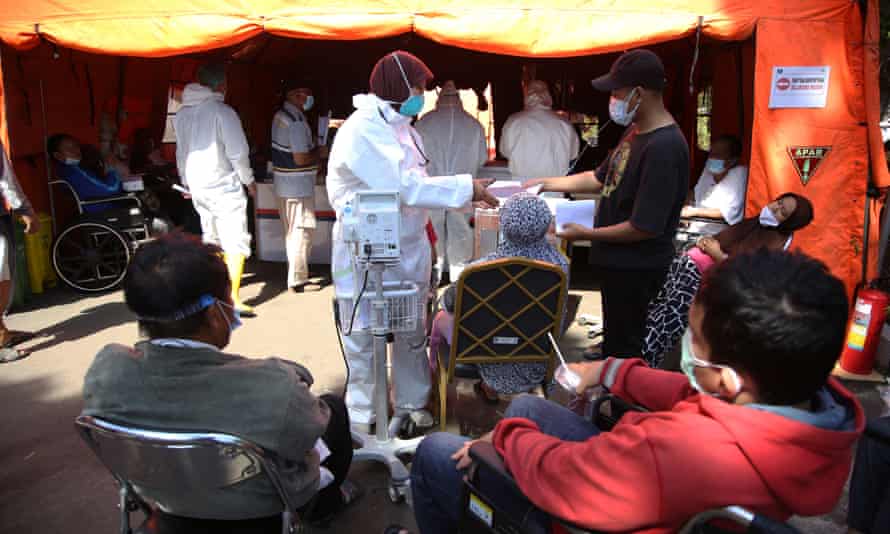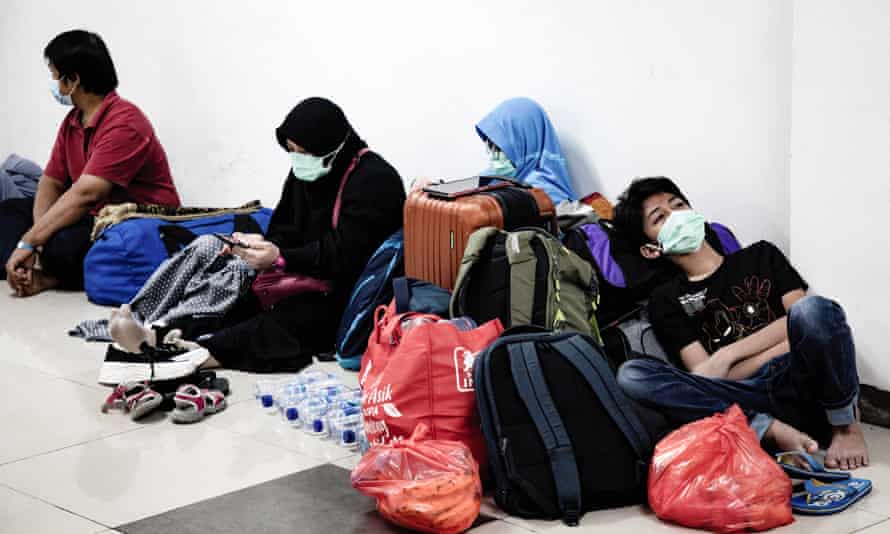Standing outside the glass wall at one of the emergency installations in a hospital in Tangerang, Benten, Uta Verina Maukar, 26, looked at her mother as she lay resting on a bed. She texted her mother, telling her that she was standing outside. Her mother looked at her from across the room, and with an oxygen mask on her face, tried to sit up so she could see her better. They both looked at each other like that for a while. That was the last time Uta saw her mother’s face.
She died from Covid the following day. She was 51.
For Uta and her brother, Varrio Sanel Maukar, 24, everything happened so quickly. When his mother tested positive for Covid on Monday, Varrio tried to stay calm. Her oxygen saturation was about 93%. The next day it dropped to 89%. That Tuesday Varrio visited four hospitals but their intensive rooms were all full.
“I called dozens of hospitals and they either did not pick up my calls or informed me that their beds were all occupied,” Uta said.
Uta said the health ministry’s website, Siranap – which is supposed to give up-to-date information on the bed availability – was unreliable. The data online didn’t match the situation inside hospitals.
Varrio found a bed in the fifth hospital he tried. But by then their mother needed specialist care.
“Doctors said she must be in the intensive care units. But they told us they were running out of beds and ventilators at the ICU,” Varrio said.
Their mother was kept in a room with five other patients; all were in a similar critical condition and waiting for a space in ICU. She died after two days in hospital.
As Covid cases have risen sharply over the past few weeks in Indonesia, more and more families like Varrio and Uta have been forced to say goodbye to their relatives. Many of them have died without receiving proper medical treatment.

Indonesia has repeatedly announced record cases over the past two weeks. On Thursday, it again recorded new highs: 24,836 new infections and 504 deaths. Health experts believe the spread of the Delta variant and travel during June’s Idul Fitri holidays have driven the surge.
Every day social media is flooded with pleas from people who are trying to find hospital rooms, blood transfusions or oxygen cylinders for their loved ones. Eva Sri Rahayu, together with her family in Bandung, West Java, used WhatsApp groups and social media to try to find AB blood donors for her brother. He died before they managed to find help.
Eva lost two of her older brothers in two days to Covid. She is now battling with the virus herself, isolated herself in her house and taken care of by her husband.
“I feel broken. I lost them only in two days. I want to grieve and cry as much as I need but I know I must think about my health. I have to take care of myself, for my family,” she said.
‘Our hospitals could really collapse’
The crisis in hospitals is so severe that volunteers at the independent coronavirus data initiative Lapor Covid, announced they can no longer assist families who are searching for beds. “Our volunteers are having a hard time finding health facilities,” Lapor Covid said this week. “Once again we apologise, please go directly to the puskesmas [community clinic], hospital or contact the health department.”
Over recent weeks pictures and videos of overwhelmed hospitals in Jakarta and West Java have been shared online. One video shows Covid patients lying on the ground next to tents that stand in front of Bekasi Regional Hospital in West Java. Next to them several patients sit in wheelchairs. Another woman lies behind a pickup truck while a medical worker checks her.
Many hospitals have converted their parking lots into emergency rooms so that they can accommodate more patients. Three major hospitals in Jakarta – Persahabatan hospital, Fatmawati hospital and Sulianti Saroso hospital – are now focused on only on treating Covid.
Hospital Association (PERSI) secretary general Lia Gardenia Partakusuma said the bed occupancy in some hospitals across provinces such as Jakarta, Banten, Yogyakarta, West Java and Central Java had already reached 100%. Infections among medical workers was placing even greater pressure on the health system, she added.
The association said the number of active cases was rising across 28 provinces. “We are now in a stagnant condition, but if those who got infected keep growing then our hospitals could really collapse,” Lia told the Guardian on Thursday.
The outbreak is currently most severe in Java, but there are also rises in cases, and increased bed occupancy rates, in areas such as West Kalimantan, Lamoung and Riau Islands.

Adib Khumaidi, head of the risk mitigation team at the Indonesian Medical Association, described the latest outbreak as a tsunami.
The lack of ICU space was a concern, he said. “When a Covid patient is experiencing respiratory failure he will need an ICU because he needs mechanical ventilation and that means he needs ventilators.”
On Thursday, the president, Joko Widodo, announced restrictions on community activities on the islands of Java and Bali until 20 July.
Health experts, however, fear these new measures will not be enough to curb the spread of the virus. Malls, parks, places of worship and tourist attractions will be closed, but essential employees can continue to go to work. There is no ban on domestic travel, only a requirement for passengers to have had at least one vaccine and a negative test result.
About 5% of the population has been fully vaccinated.
On Friday morning, Varrio and Uta buried their mother. Only six family members were allowed to accompany her body to the grave. One of them streamed the funeral on Zoom, so that relatives could watch online.
“We only have ourselves to rely on,” Varrio said. “So, [we must] take care of ourselves and our families.”








